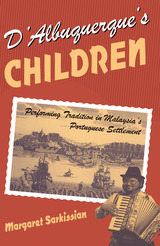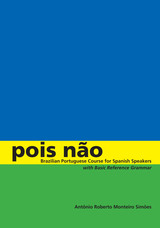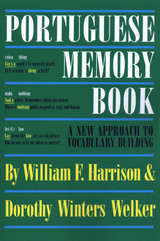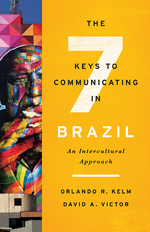

Robert H. Moser details the emergence of a prominent motif in modern Brazilian literature, namely the carnivalesque defunto (the dead) that, in the form of a protagonist or narrator, returns to beseech, instruct, chastise, or even seduce the living. Drawing upon the works of esteemed Brazilian writers such as Machado de Assis, Érico Veríssimo, and Jorge Amado, Moser demonstrates how the defunto, through its mocking laughter and Dionysian resurrection, simultaneously subverts and inverts the status quo, thereby exposing underlying points of tension within Brazilian social and political history.
Incorporating elements of both a celestial advocate and an untrustworthy specter, the defunto also serves as a metaphor for one of modern Brazil’s greatest dilemmas: reconciling the past with the present.
The Carnivalesque Defunto offers a comparative framework by juxtaposing the Brazilian literary ghost with other Latin American, Caribbean, and North American examples. It also presents a cross-disciplinary approach toward understanding the complex relationship forged between Brazil’s spiritual traditions and literary expressions.

Cartas e Cronicas contains three dozen selections form Brazilian newspapers accompanied by vocabulary lists and comprehension exercises.

Compares the sounds, phonology, and prosody of General American English and Southeastern Brazilian Portuguese.

Using historical and ethnographic data, Margaret Sarkissian reveals that this music and dance draws on an eclectic array of influences that span the Portuguese diaspora (one song conjures up images of Lucille Ball impersonating Carmen Miranda on "I Love Lucy"). Ironically, she shows, what began as a literate tradition in the 1950s has now become an oral one so deeply rooted in Settlement life that the younger generation, like the tourists, now see it as an unbroken heritage stretching back almost 500 years. A fascinating case of "orientalism in reverse," D'Albuquerque's Children illuminates the creative ways in which one community has adapted to life in a postcolonial world.


This study analyzes passive sentences in English and Portuguese which result from a post-semantic transformation applied when a nound, which does not play the semantic role of actor, is chosen as syntactic subject. Choice between a passive and its non-passive or active counterpart reflects differences in the distribution of information in the sentence as regards the relative importance of the latter's constituents for communication. Such distribution is analyzed in terms of Praque school theory, especially that involving the notions of communicative dynamism and the distribution of theme and rheme.
The book concludes with a contrastive analysis of English and Portuguese passive sentence patterns which serves as the basis for observations on the teaching of Portuguese passives to native speakers of English.

Spanish speakers can learn Brazilian Portuguese much more rapidly than any other language, and thousands of students have used Antônio Simões's text/workbook Com licença: Brazilian Portuguese for Spanish Speakers to make the transition between the two languages. Recognizing the need for a text that incorporates current cultural references and the latest language pedagogy, Simões now offers Pois não: Brazilian Portuguese Course for Spanish Speakers, with Basic Reference Grammar.
Pois não contrasts Portuguese and Spanish, which accomplishes two main goals. It teaches the equivalent of one year of college Portuguese in one semester, three times a week, to Spanish speakers who also have a solid understanding of English. Additionally, the book serves as a basic reference guide to Brazilian Portuguese for the same audience.
Pois não can be used by students in the classroom or by independent learners. Users of the book may focus on the drills alone, concentrate on both the explanations and drills, or use the book as a reference for consultation only. Answers to all of the exercises are included in the book. Audio and video recordings by native Brazilian speakers of dialogues that appear in the book can be downloaded at https://utexas.box.com/v/PoisNaoAudio.

An essential, comprehensive guide for all who are interested in learning the Portuguese language and mastering its complexities, Portuguese: A Reference Manual supplements the phonetic and grammatical explanations offered in basic textbooks. While the Manual focuses on Brazilian Portuguese, it incorporates European Portuguese variants and thus provides a more complete description of the language. Accessible to non-linguists and novice language learners, as well as informative for instructors of Portuguese and specialists in other languages, this guide incorporates the Orthographic Accord (in effect since 2009–2010), which attempts to standardize Portuguese orthography.
The Manual reflects the language as it is currently taught at both the undergraduate and graduate levels by providing detailed explanations of the sound and writing systems and the grammar of the principal Portuguese dialects. A reference guide rather than a textbook, the Manual also provides extensive verb charts, as well as comparisons of Portuguese with English and Spanish.

Mnemonics is an age-old device for remembering names, numbers, and many other things. The Portuguese Memory Book, by William F. Harrison and Dorothy Welker, makes use of this reliable memory help in a series of mnemonic jingles that are by turns playful, sardonic, touching, and heroic to help both students and independent learners acquire and remember Portuguese vocabulary.
The mnemonic jingles present both the sound of the Portuguese word (indicated by syllables in underlined boldface type) and its English meaning (given by a word or phrase in boldface type):
noite (f.) night
Don't annoy Chihuahuas in the night.
If you ignore their bark, you'll feel their bite.
This innovative approach to vocabulary building is simple, effective, and entertaining. The authors also include a general pronunciation guide to Brazilian Portuguese, particularly to the Carioca dialect of Rio de Janeiro.

Long before the concept of “globalization,” the Portuguese constructed a vast empire that extended into Africa, India, Brazil, and mid-Atlantic territories, as well as parts of China, Southeast Asia, and Japan. Using this empire as its starting point and spanning seven centuries and four continents, The Portuguese-Speaking Diaspora examines literary and artistic works about the ensuing diaspora, or the dispersion of people within the Portuguese-speaking world, resulting from colonization, the slave trade, adventure seeking, religious conversion, political exile, forced labor, war, economic migration, and tourism.
Based on a broad array of written and visual materials, including historiography, letters, memoirs, plays, poetry, fiction, cartographic imagery, paintings, photographs, and films, The Portuguese-Speaking Diaspora is the first detailed analysis of the different and sometimes conflicting cultural productions of the imperial diaspora in its heyday and an important context for understanding the more complex and broader-based culture of population travel and displacement from the former colonies to present-day “homelands.” The topics that Darlene J. Sadlier discusses include exploration and settlement by the Portuguese in different parts of the empire; the Black Atlantic slave trade; nineteenth-century travel and Orientalist imaginings; the colonial wars; and the return of populations to Portugal following African independence. A wide-ranging study of the art and literature of these and other diasporic movements, this book is a major contribution to the growing field of Lusophone studies.

This is the first volume of a basic course organized around the concept that to learn another language is to internalize another set of linguistic rules.
A set of 11 audiocassettes totaling 11 hours is available to accompany this volume.

This second volume of the basic Portuguese course contains additional readings for vocabulary refinement and development of cultural knowledge.
A set of 10 audiocassettes is available to accompany Volume II.

The key to professional success in Brazil is understanding Brazilians. But how do you understand an unfamiliar culture? Seasoned cross-cultural trainers Orlando R. Kelm and David A. Victor use Victor’s groundbreaking approach of evaluating a culture’s language, environment, social organization, context, authority, nonverbal communication, and time conception to provide a framework for understanding Brazilians and show effective strategies to overcome these communication barriers. The method, referred to as the LESCANT approach makes you the expert evaluator of the culture and helps you easily navigate hurdles that can challenge business relationships.
Each chapter of The Seven Keys to Communicating in Brazil employs memorable anecdotes, business cases on each topic from business professionals, and photographs to address key topics. The authors demonstrate how to evaluate the cultural differences between Brazil and North America and include examples of common communication mistakes. Engaging and accessible, the book helps North Americans master the nuances of the Brazilian language and achieve a real experience of the Brasil dos brasileiros.

Spain and Portugal in the New World, 1492-1700 was first published in 1984. Minnesota Archive Editions uses digital technology to make long-unavailable books once again accessible, and are published unaltered from the original University of Minnesota Press editions.
Spanish and Portuguese expansion substantially altered the social, political, and economic contours of the modern world. In his book, Lyle McAlister provides a narrative and interpretive history of the exploration and settlement of the Americas by Spain and Portugal.
McAlister divides this period (and the book) into three parts. First, he describes the formation of Old World societies with particular attention to those features that influenced the directions and forms of overseas expansion. Second, he traces the dynamic processes of conquest and colonization that between 1492 and about 1570 firmly established Spanish and Portuguese dominion in the New World. The third part deals with colonial growth and consolidation down to about 1700. McAlister's main themes are: the post-conquest territorial expansion that established the limits of what later came to be called Latin America, the emergence of distinctively Spanish and Portuguese American societies and economies, the formation of systems of imperial control and exploitation, and the ways in which conflicts between imperial and American interests were reconciled.
This comprehensive history, with its extensive bibliographic essay and attention to historiographic issues, will be a standard reference for students and scholars of the period.

Working Portuguese for Beginners enables English speakers with no prior knowledge of Brazilian Portuguese to develop the basic communication skills and cultural knowledge needed to visit Brazil and to function in a work environment in which Portuguese is spoken. This language program presents not only all the situations and grammar normally covered in an elementary Portuguese textbook but also includes situations set in a business context in every lesson.
Major Features:• Twenty-four lessons, the last four concluding with a special independent project in which the student applies the language to his or her area of professional interest• Clear objectives for acquiring language skills, grammar, and cultural understanding• Lessons cover the important basics normally covered in any beginning Portuguese textbook such as introductions and greetings, counting, making travel plans, taking public transportation, and asking for directions• Lessons cover business tasks such as negotiating a contract, presenting a new product, writing a business memo—all in Brazilian Portuguese• Lessons provide dialogues and vocabulary lists for reading and listening, grammar, cultural reading, and interactive homework• Portuguese-English and English-Portuguese glossaries offer additional help with vocabulary• Course can be combined with affordable online access to self-grading exercises (available through Quia.com, $24.95 per student for 18 months of access)
Student’s Book• Includes MP3 tracks of vocabulary, dialogues, and audio exercises on CD• Lessons are valuable to the classroom student as well as self-directed independent learners
Teacher’s Edition• Includes a CD-ROM with all MP3 tracks of vocabulary, dialogues, and audio exercises found on the student’s disk• CD-ROM also provides quizzes and a midterm, materials for special activities, and approximately 300 supplementary PowerPoint slides for classroom presentation Online teaching features at Quia.com • Instructor-managed class activities and exercises • Monitoring of student progress • Customized grading options online • Students can complete exercises online, submit their answers electronically to their instructor, and receive automatic feedback • Teachers can also use Quia templates to build their own exercises or use exercises developed by other instructors to provide added help for students • Motivated self-directed learners can also access the self-grading online exercises at Quia.com (no instructor feedback will be provided)
SYSTEM REQUIREMENTS
System Requirements for Student's Edition Textbook Disk• Windows 2000 or later or Mac OS 10.2 or later• DVD-ROM drive on a computer or conventional DVD-ROM with MP3 player• Sound card and speakers or earphones for audio• An MP3 player, such as Windows Media Player or iTunes (available as a free download)
System Requirements for Teacher's Edition Textbook DVD-ROM • Windows 2000 or later (including Windows XP, Windows Vista, Windows 7) or Mac OS 10.2 or later (including OS X 10.3, 10.4, 10.5, 10.6)• DVD-ROM drive• Sound card and either speakers or earphones (for MP3 files)• For PCs, Microsoft Word 2000 or later or for Macs, Microsoft Word X or later (for .doc files)• For PCs: PowerPoint 2000 or later (to edit PowerPoint PPT files) or to view PowerPoints only, PowerPoint Viewer 2003 or higher (available as a free download from www.microsoft.com); for Macs: PowerPoint X or later (for PowerPoint files)• An MP3 player, such as Windows Media Player or iTunes (available, respectively, as a free download from www.microsoft.com and www.itunes.com)• For PCs, Adobe Acrobat or Reader 9 or later, or for Macs Adobe Acrobat or Reader 6.0 or later (Adobe Reader is available as a free download from www.adobe.com)
System Requirements for the Online Exercises (Mac and PC)• Computer with Internet access, preferably a high-speed connection• Java-enabled browser: PC: Internet Explorer 6.x or higher, or Firefox 3.x or higherMac: Firefox 3.x or higher, or Safari 3.x or higher• The program QuickTime (available as a free download from http://www.quicktime.com) is needed to play audio• Speakers or headphones to hear audio• Microphone to record answers or responses
READERS
Browse our collection.
PUBLISHERS
See BiblioVault's publisher services.
STUDENT SERVICES
Files for college accessibility offices.
UChicago Accessibility Resources
home | accessibility | search | about | contact us
BiblioVault ® 2001 - 2024
The University of Chicago Press









